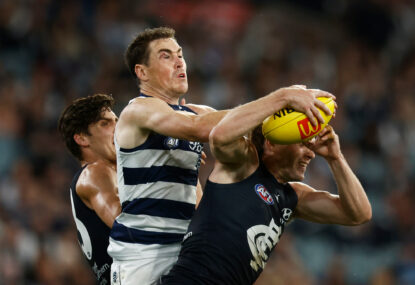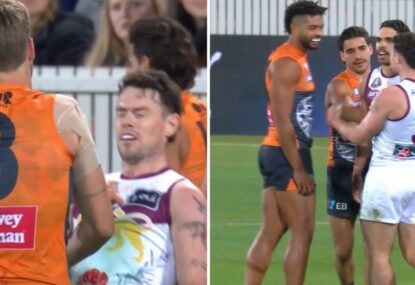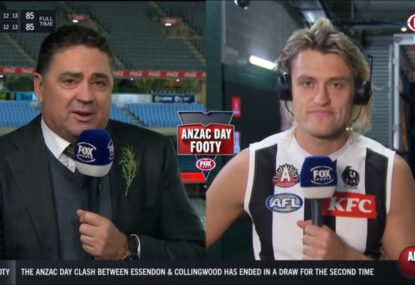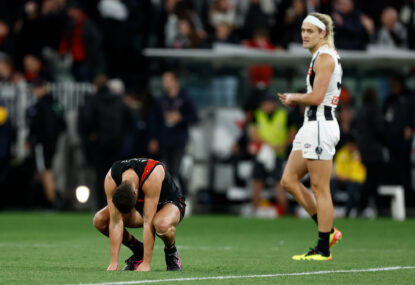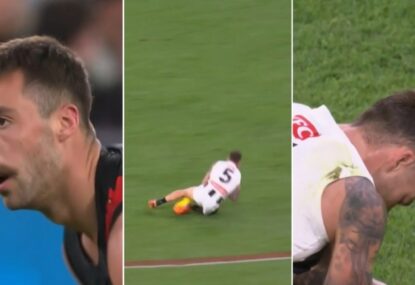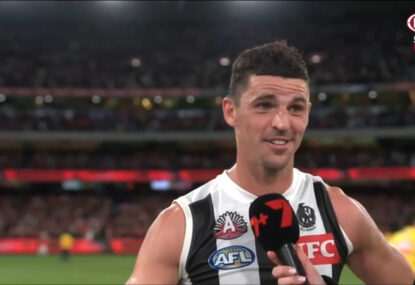So, now the season’s on in earnest!
For a while there it felt like 2018 wasn’t going to embroil the AFL’s abbreviated judicial process in a decent controversy. Michael Christian and Stephen Hocking might have been getting ready to start believing they’d found the magic touch.
But, no. Over a period of less than 24 hours, from Saturday evening in Adelaide to Sunday arvo at Etihad Stadium, the ship hit the span thrice.
First, it was one of the usual suspects, Lindsay Thomas. Next up, a most unusual suspect: the early Brownlow favourite, Tom Mitchell. Then, finally – and most resoundingly – the fresh-faced Ryan Burton.
Suddenly, the media’s season sprang to life. The Monday night footy review shows were back to their best. And Michael Christian might have realised with a jolt that Malcolm Fraser and Ayn Rand were right: life for a one-man match reviewer wasn’t meant to be easy.
And this wasn’t just a test of the new one-man show or of Christian’s judgement. It was also a test of the credibility of a system that has been re-jigged in a far more radical way than, perhaps, is generally understood.
For Stephen Hocking’s new judicial process is now up for examination and there’s good reason to feel concerned.
This assessment applies not so much to the two more injurious incidents the MRO was forced to consider, but to the most innocuous one among them: that of Mitchell.
The star of the first three rounds of this season had a modest game on Sunday and, perhaps in frustration, raised a forearm/elbow to the head of North Melbourne’s Todd Goldstein.
And it doesn’t matter whether the judgement made on his action was right or wrong, the case lays bare the folly of Christian being forced to deal with the AFL’s football boss in his deliberations.
Not only is the new process not independent, there is absolutely no pretence that it is. Whether this is due to a failure on the modern AFL’s part to understand the importance of the concept of independence, or whether the administration has become so cock-sure as to not care, it shouldn’t be this way. It treats the public, not to mention its judicial process, with contempt.
An argument on behalf of it is that it’s a bit like the matter of on-the-spot traffic fines issued by police. It’s quick, it removes a layer of bureaucracy, and an aggrieved driver can always take the case to court. Or, in the football context, to the tribunal.
But there’s a major difference in the football context. It’s this: whereas on the roads a person being given the benefit of the doubt by a policeman isn’t the issue (unless, of course, there’s a hint of corruption), in footy the acquittals are just as important as the convictions. And the AFL’s finger-prints are now on every judgement.
In some instances, this will bring questioning of outcomes. Consider the case of Mitchell. Of course, it’s way too early to imagine he’ll win the Brownlow but there’s every chance he’ll be a contender. And the AFL would prefer contenders not to have asterisks next to their name come Brownlow night.
It holds a gala dinner which is nationally televised, and the ‘contest’ between the contenders is integral to the success of the night. Obviously, the more ‘live’ contenders the better.
So, in Round 5, the early favourite for the award clocks an opponent in the head. Neither hard, nor particularly maliciously, but he clocked him. And the MRO’s judgement was to charge him with ‘Misconduct’, which can’t bring more than a fine.

(AAP Image/Joe Castro)
Now, that may have been the right judgement. But it would be a far more believable one if it was delivered by a process at arms-length from the AFL.
Even if the match review outcomes are consistently achieved with perfect objectivity, the process that delivers them will now invite legitimate questioning.
Having said that, I think the process had a pretty reasonable week. Lindsay Thomas chose to run at an opponent who was never out of a crouch. This all but ensured contact would be made to the head, and Thomas had to be accountable for that.
As for the nasty collision that hospitalised North Melbourne’s Shaun Higgins, I agree with the outcome delivered on Ryan Burton.
The young Hawk didn’t charge at Higgins and it was the ball carrier’s momentum, more than that of the tackler, which made the contact as heavy as it was.
You could argue that Burton actually made a good football decision in that, by blocking Higgins’ path, he caused him to release the ball. That having happened, had Burton laid a tackle it would have been illegal.
All good stuff for debate, though, and no doubt there will be more as the season wears on.
That some of it might cause questioning of the Match Review process is a matter the AFL will have to deal with.































































































